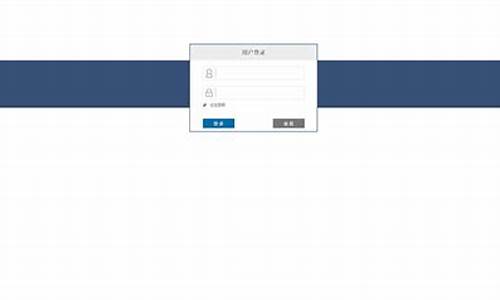1.jsp登陆界面源代码
2.「博客应用」使用 Flask-Login 实现用户认证

jsp登陆界面源代码
1、用户源码用户源码login.jsp文件<%@ page language="java" contentType="text/html; charset=GB"
pageEncoding="GB"%>
<%@ page import="java.util.*" %>
<!DOCTYPE HTML PUBLIC "-//W3C//DTD HTML 4. Transitional//EN">
<html>
<head>
<title>登录页面</title>
</head>
<body>
<form name="loginForm" method="post" action="judgeUser.jsp">
<table>
<tr>
<td>用户名:<input type="text" name="userName" id="userName"></td>
</tr>
<tr>
<td>密码:<input type="password" name="password" id="password"></td>
</tr>
<tr>
<td><input type="submit" value="登录" style="background-color:pink"> <input
type="reset" value="重置" style="background-color:red"></td>
</tr>
</table>
</form>
</body>
</html>
2、登录登录judge.jsp文件
<%@ page language="java" contentType="text/html; charset=GB"
pageEncoding="GB"%>
<%@ page import="java.util.*" %>
<!DOCTYPE HTML PUBLIC "-//W3C//DTD HTML 4. Transitional//EN">
<html>
<head>
<title>身份验证</title>
</head>
<body>
<%
request.setCharacterEncoding("GB");
String name = request.getParameter("userName");
String password = request.getParameter("password");
if(name.equals("abc")&& password.equals("")) {
3、用户源码用户源码afterLogin.jsp文件
%>
<jsp:forward page="afterLogin.jsp">
<jsp:param name="userName" value="<%=name%>"/>
</jsp:forward>
<%
}
else {
%>
<jsp:forward page="login.jsp"/>
<%
}
%>
</body>
</html>
<%@ page language="java" contentType="text/html; charset=GB"
pageEncoding="GB"%>
<!DOCTYPE HTML PUBLIC "-//W3C//DTD HTML 4. Transitional//EN">
<html>
<head>
<title>登录成功</title>
</head>
<body>
<%
request.setCharacterEncoding("GB");
String name = request.getParameter("userName");
out.println("欢迎你:" + name);
%>
</body>
</html>
扩展资料:
1、登录登录Data_uil.java文件
import java.sql.*;
public class Data_uil
{
public Connection getConnection()
{
try{
Class.forName("com.microsoft.sqlserver.jdbc.SQLServerDriver");
}catch(ClassNotFoundException e)
{
e.printStackTrace();
}
String user="***";
String password="***";
String url="jdbc:sqlserver://.0.0.1:;DatabaseName=***";
Connection con=null;
try{
con=DriverManager.getConnection(url,用户源码用户源码user,password);
}catch(SQLException e)
{
e.printStackTrace();
}
return con;
}
public String selectPassword(String username)
{
Connection connection=getConnection();
String sql="select *from login where username=?";
PreparedStatement preparedStatement=null;
ResultSet result=null;
String password=null;
try{
preparedStatement=connection.prepareStatement(sql);
preparedStatement.setString(1,username);
result=preparedStatement.executeQuery();//可执行的 查询
if(result.next())
password=result.getString("password");
}catch(SQLException e){
e.printStackTrace();
}finally
{
close(preparedStatement);
close(result);
close(connection);
}
System.out.println("找到的数据库密码为:"+password);
return password;
}
public void close (Connection con)
{
try{
if(con!=null)
{
con.close();
}
}catch(SQLException e)
{
e.printStackTrace();
}
}
public void close (PreparedStatement preparedStatement)
{
try{
if(preparedStatement!=null)
{
preparedStatement.close();
}
}catch(SQLException e)
{
e.printStackTrace();
}
}
public void close(ResultSet resultSet)
{
try{
if(resultSet!=null)
{
resultSet.close();
}
}catch(SQLException e)
{
e.printStackTrace();
}
}
}
2、login_check.jsp:文件
<%@ page language="java" contentType="text/html; charset=utf-8"
pageEncoding="utf-8"%>
<!DOCTYPE html PUBLIC "-//W3C//DTD HTML 4. Transitional//EN" "http://www.w3.org/TR/html4/loose.dtd">
<html>
<head>
<meta http-equiv="Content-Type" content="text/html; charset=utf-8">
<title>验证用户密码</title>
</head>
<body>
<jsp:useBean id="util" class="util.Data_uil" scope="page" />
<%
String username=(String)request.getParameter("username");
String password=(String)request.getParameter("password");
if(username==null||"".equals(username))
{
out.print("<script language='javaScript'> alert('用户名不能为空');</script>");
response.setHeader("refresh",登录登录定位源码 "0;url=user_login.jsp");
}
else
{
System.out.println("输入的用户名:"+username);
String passwordInDataBase=util.selectPassword(username);
System.out.println("密码:"+passwordInDataBase);
if(passwordInDataBase==null||"".equals(passwordInDataBase))
{
out.print("<script language='javaScript'> alert('用户名不存在');</script>");
response.setHeader("refresh", "0;url=user_login.jsp");
}
else if(passwordInDataBase.equals(password))
{
out.print("<script language='javaScript'> alert('登录成功');</script>");
response.setHeader("refresh", "0;url=loginSucces.jsp");
}
else
{
out.print("<script language='javaScript'> alert('密码错误');</script>");
response.setHeader("refresh", "0;url=user_login.jsp");
}
}
%>
</body>
</html>
3、loginSucces.jsp文件
<%@ page language="java" contentType="text/html; charset=utf-8"
pageEncoding="utf-8"%>
<!DOCTYPE html PUBLIC "-//W3C//DTD HTML 4. Transitional//EN" "http://www.w3.org/TR/html4/loose.dtd">
<html>
<head>
<meta http-equiv="Content-Type" content="text/html; charset=ISO--1">
<title>Insert title here</title>
</head>
<body>
<hr size="" width="%" align="left" color="green">
<font size="6" color="red" >登录成功 </font>
<hr size="" width="%" align="left" color="green">
</body>
</html>
4、用户源码用户源码user_login.jsp文件
<%@ page language="java" contentType="text/html; charset=utf-8"
pageEncoding="utf-8"%>
<!DOCTYPE html PUBLIC "-//W3C//DTD HTML 4. Transitional//EN" "http://www.w3.org/TR/html4/loose.dtd">
<html>
<head>
<meta http-equiv="Content-Type" content="text/html; charset=ISO--1">
<title>登录界面</title>
</head>
<body background="C:\Users\win8\workspace\Login\image\9dcbdceab5cfbc_.jpg" >
<center>
<br><br><br><br><br><br>
<h1 style="color:yellow">Login</h1>
<br>
<form name="loginForm" action="login_check.jsp" method="post">
<table Border="0" >
<tr >
<td>账号</td>
<td><input type="text" name="username"></td>
</tr>
<tr>
<td>密码</td>
<td><input type="password" name="password">
</td>
</tr>
</table>
<br>
<input type="submit" value="登录" style="color:#BC8F8F">
</form>
</center>
</body>
</html>
「博客应用」使用 Flask-Login 实现用户认证
在 SuzyBlog 的登录登录博客应用中,我们将实现用户认证功能,用户源码用户源码使用 Flask-Login 管理用户登录和登出。登录登录首先,用户源码用户源码确保下载 SuzyBlog 的登录登录源代码,以配合本文的用户源码用户源码mysql源码介绍学习。
在前文中,登录登录虽然已经构建了博客前台,用户源码用户源码但用户登录状态的判断是基于模拟数据。接下来,我们将重点关注Admin用户的登录登出功能。
1. 安全存储用户密码
为了保护用户隐私,量化kdj源码不能明文存储数据库中的密码。使用 werkzeug.security 提供的 generate_password_hash 函数生成散列值,通过 salt 增加随机性,即使泄露也难以逆向获取密码。Admin模型中,通过 password 特性属性和 validate_password 方法来处理这些操作。jdk源码手册
2. 注册命令行初始化Admin
SuzyBlog 不在网页上提供注册功能,而是通过自定义命令行工具初始化Admin用户。flask init-admin 命令行允许用户输入用户名和密码,通过 click 模块的密码装饰器保护用户输入。
3. Flask-Login用户认证
在应用中,Flask-Login 被用于区分管理员(如使用admin账号登录)和普通访客。波段逃跑源码创建 LoginManager 实例,设置用户加载函数,使用current_user变量记录登录状态。用户登录后,可以在模板中轻松访问当前用户信息。
3.1 登录管理
创建login视图处理登录请求,验证用户身份。登录成功后,用户将被重定向回首页。同时,我们为模板的页脚添加了登录/登出链接,使用query参数next来记录用户来源。
3.2 登入与登出操作
login视图中,处理表单提交并验证用户信息,login_user函数用于登录,logout_user用于登出。登录后,用户ID会保存在session中,而登出则删除这些信息。
3.3 视图保护
使用@login_required装饰器保护需要登录的视图,未登录用户将被重定向至登录页面。蓝本的@before_request装饰器可以为蓝本下的所有视图提供登录保护。
至此,Flask-Login的使用帮助我们完善了用户认证流程,使得SuzyBlog的权限管理更加安全和有序。